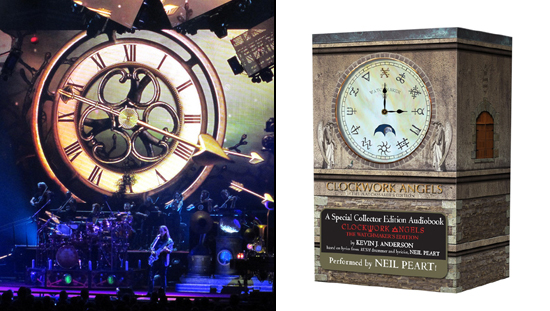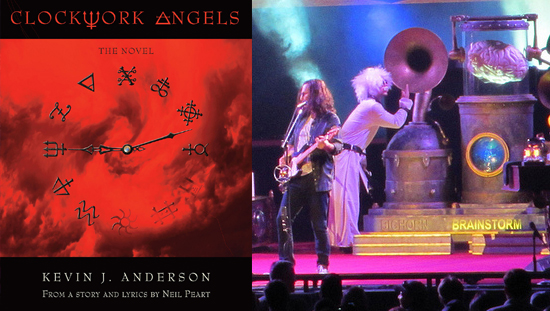Rush Releases Steampunk Clock, Audiobook, Rash of New Tour Dates
There is possibly nothing nerdier in the world of music than progressive rock, and in the world of prog rock there’s nothing geekier than Rush, the Canadian trio described as “the world’s biggest cult band.” While they’ve been around since 1974, making them one of the most enduring prog rockers out there, this last year has been a momentous one for both Rush and their legion of smart-but-awkward, fanatic-but-quiet fans who stand in the shadows or at least stage left. Here’s why: They’ve recently announced a continuation of their Clockwork Angels tour — in which they performed nearly the whole eponymous steampunk concept album they released last year. And oh yeah, this year they’re being inducted into the Rock and Roll Hall of Fame — after years of exasperation from fans, though they were totally cool with the exclusion. So, what’s the actual news? Tomorrow they’re releasing Clockwork Angels: The Watchmaker’s Edition.
Given its price ($62.99 on Amazon), this probably isn’t an easy grab even for hardcore fans, but Clockwork Angels: The Watchmaker’s Edition is an audiobook of the novelization of the album — written by Nebula-nominated sci-fi author Kevin J. Anderson in cahoots with Rush’s drummer/lyricist Neil Peart — packaged in a miniature clock tower with a working clock. Nerdy and slick, but yeah, expensive.
Now I feel the need to explain why we at Geekosystem — or specifically I, as there’s no accounting for taste — would be talking about this band. If you’re a Rush fan, you already know. If you’re not, or if all you know about Rush is that the singer, Geddy Lee, has a “squirrelly” voice (my father’s description), then allow me to concisely bullet the reasons.
- Musically, they are sophisticated and experimental, with zany time signatures and crazy-complex percussion.
- Lyrically they are poetically inquisitive. Blender once rated Neil Peart as one of the worst lyricists ever (along with Sting), describing his lyrics as “richly awful tapestries of fantasy and science.” Which is a delightful compliment, coming from such a magazine.
- 2012: The concept album Clockwork Angels is about a young man in a steampunk world who challenges the orderly, seemingly utopian society he lives in, a world of clockwork efficiency, weather-predicting alchemy, and absolute ignorance. There are airships, steamliners, and alchemical bombs.
- 1985-2013: Nine studio albums featuring erudite lyrics and themes of science, philosophy, society, and history.
- 1984: Grace Under Pressure includes songs about post-apocalyptic prisons, escaping androids, and tensions of the Cold War.
- 1980-1982: Three studio albums featuring bombastic lyrics about “human interface and interchange.” The album Moving Pictures includes the one song that even non-Rush fans tend to encounter: “Tom Sawyer.”
- 1977-1978: Two studio albums, A Farewell to Kings and Hemispheres, offer tales of fantasy (“Xanadu”) and science fiction “Cygnus X-1” and “Hemispheres,” wherein a space pilot flies his ship into a black hole and ends up on in an alternate world of Greek myths, then subsquently becomes their god of balance in a world fractured by both logic and emotion. Nerdy across the board.
- 1976: 2112 invokes Ayn Rand’s novella Anthem but with a musical spin, in which a young man in the year 2112 discovers a guitar and sticks it to the man, who happen to be the priests of the Temples of Syrinx, who control all aspects of life and suppress individuality and artist expression.
- 1975: Caress of Steel features the Tolkienesque song “The Necromancer,” in which three heroes take on a dread sorcerer. And the 20-minute “The Fountain of Lamneth,” in which a young man goes on an epic and somewhat Odyssey-like quest for a sort of fountain of youth and grows old by doing it.
- 1975: Fly By Night includes the song “Rivendell.” Need I say more?
- 1974: Rush gets started in the same year as Dungeons & Dragons. I’m telling you, the stars were right.
You might note that there’s hardly any talk of love in all that. Sure, there are one or two, but Rush love songs have intellectually romantic lyrics like:
You and I, we are strangers by one chromosome
Slave to the hormone, body and soul
In a struggle to be happy and free
Swimming in a primitive sea
If nothing else, consider listening to 1984’s “The Body Electric,” which is about a robot who escapes the routines he’s been locked into for one hundred years. Or just watch the laughable-but-still-fun video. If you haven’t heard this before, you’d be doing yourself a disservice by not rectifying the situation now.
(images courtesy of Amazon, swimfinfan, pmsyyz)
- Bat For Lashes video might make sense if you’re crazy already
- The London Symphony Orchestra performs Final Fantasy
- New Bioshock trailer is steampunky
Have a tip we should know? [email protected]

